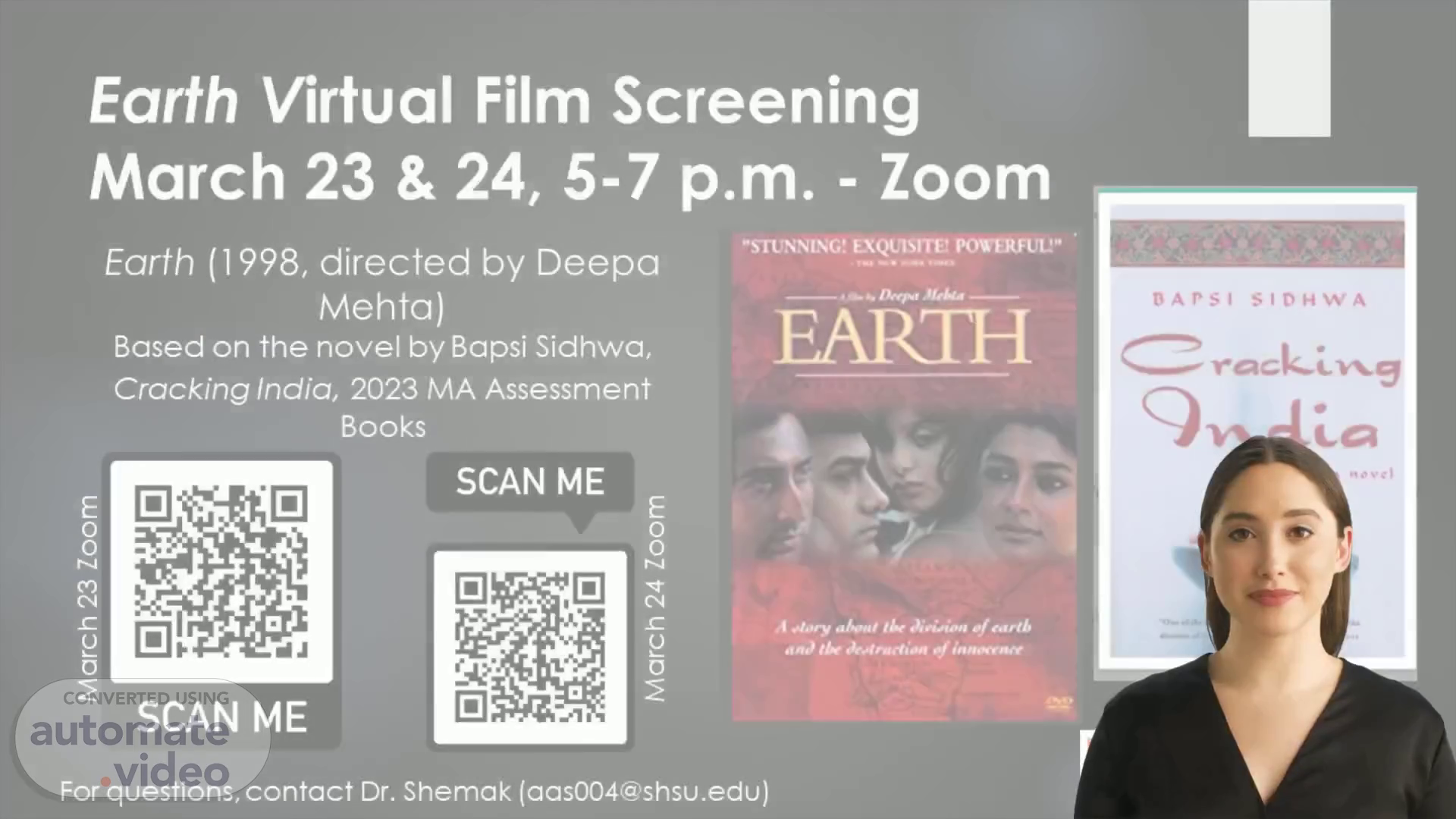
PowerPoint Presentation
Scene 1 (0s)
Qr code Description automatically generated.
Scene 2 (24s)
[Virtual Presenter] ""Earth", the groundbreaking film released in 1998, is based on Bapsi Sidhwa’s novel "Cracking India". This is the second film in Deepa Mehta’s “elements” trilogy, the first being "Fire" which was banned in India due to its plotline. The third film in the trilogy is "Water", dealing with the treatment of widows in India. This August marks the 75th anniversary of Indian Independence/Partition. This event marked the end of British colonizers governing and leaving India, though many scholars argue that the decisions to "carve up" India were hastily made by the British colonizers and led to the chaotic events of Partition. An understanding of the importance of "Earth" and the trilogy, I'm now ready to show you the film..
Scene 3 (1m 9s)
[Audio] In 1947, independence from Britain was granted to both India and Pakistan. This event, referred to as Partition, had a lasting effect on the region. Hindus were designated for India and Muslims for Pakistan, which led to a great number of people migrating from one country to the other. After a war, Bangladesh was formed. Earth, a movie based on Bapsi Sidhwa’s novel Cracking India, is set against this backdrop. The "Elements" trilogy, to which this movie belongs, demonstrates the influence of gender and sexuality on the lives of its characters..
Scene 4 (1m 52s)
[Audio] Earth is set in the time of British colonial rule in India. Focusing on the Partition of India in 1947, when the British Raj ended and India was divided into two countries - Pakistan and India, the film follows the story of a young Hindu girl, Lenny, living in Lahore amidst religious divides, displacement and violence. It is a remarkable tale of courage, resilience and hope in the face of tremendous tragedy. Furthermore, it is a stunning visual investigation of a place and time that crucially shaped modern India and Pakistan. Get ready to watch Earth and explore a story that altered the destiny of two nations..
Scene 5 (2m 37s)
[Audio] """A powerful film, "Earth" introduces us to the devastating impact of the Partition of India in 1947. Following two families whose lives are split apart by the Partition, the film shows how their characters are formed by their experiences with the socio-economic and political changes brought about by this event. It is a poignant reminder of how big historical events can shape the lives of individuals."".
Scene 6 (3m 4s)
[Audio] "Set in 1947, India is amidst great political turmoil and social unrest as it fights to gain independence from the British. Earth provides an eye-opening portrayal of the ways in which politics and gender roles shape the lives of Indian citizens through the lens of a young girl, Lenny, and her closest friends. The film dives into the effects of the Partition of India and the refugee crisis on individuals and families, while raising questions about religion, nationality, and caste. Earth is an emotionally captivating film that will both entertain and educate us. Let's begin our virtual screening of Earth..
Scene 7 (3m 47s)
[Audio] When adapting a book to film, there are many differences to consider - from different narrative elements, to how the way characters are developed and the story is told. The visual and aural elements can create a distinct experience for a viewer, potentially different from the reader’s experience of the novel. Such is the case with Earth, based on the novel Cracking India by Bapsi Sidhwa, and contributes to the film's profoundness..
Scene 8 (4m 15s)
[Audio] Considering Earth, Deepa Mehta's second installment of her 'Elements' trilogy, we shall compare scenes from the film with those from Bapsi Sidhwa’s novel, Cracking India; assess the film's adaptation's faithfulness; and consider the significance of languages other than English. Each will be discussed in further detail..
Scene 9 (4m 39s)
[Audio] Lenny's question in Earth, "Can one break a country?", foreshadows the violence and unrest that will soon befall India in its struggle for independence. The film shows the distinct differences in the upper class British and Indian colonial classes. It also gives an insight into the cultures of the Indian and British characters and how they clash and interact. The servitude of the servants in the kitchen and how they relate to people at the table is an example of how class-based discrimination affects Indian society. Earth powerfully presents a story of India's struggle for independence, highlighting how our everyday lives are connected to larger historical events..
Scene 10 (5m 22s)
[Audio] Let me give a brief introduction to the film Earth. It is based on Bapsi Sidhwa’s novel Cracking India, and is the second film in Deepa Mehta’s “elements” trilogy. The first movie, Fire, was met with controversy due to its lesbian relationship plotline, and the third film, Water, addressed the issue of the treatment of widows in India. The themes that run throughout the trilogy are those of gender and sexuality and their impacts on the lives of these characters. Now, let’s begin watching Earth, and I hope you enjoy it. Thank you..